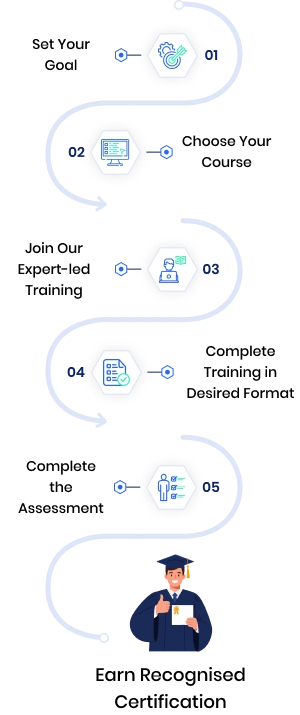Course Overview O v e r v i e w
- Course Overview
- Course Outline
- What’s Included
- What You’ll Learn
CCNA Certification Overview
The CCNA Certification Course offers a comprehensive introduction to Cisco networking technologies and solutions. It covers networking fundamentals, IP addressing, routing, and network security, along with automation and programmability concepts. The course prepares learners to manage and optimise small to medium-sized networks effectively.
Formal training enables learners to build confidence in configuring Cisco devices and maintaining network performance. It enhances troubleshooting abilities, strengthens network design understanding, and supports readiness for the globally recognised CCNA certification.
At Training Deals, we provide Cisco-accredited training designed by networking professionals. Our certified trainers deliver practical, hands-on sessions with real Cisco lab environments. With flexible learning modes and complete support, we help you develop the expertise to advance your networking career.

CCNA Certification Outline
Domain 1: Network Fundamentals
Explain the Role and Function of Network Components
Describe the Characteristics of Network Topology Architectures
Compare Physical Interface and Cabling Types
Identify Interface and Cable Issues
Compare TCP to UDP
Configure and Verify IPv4 Addressing and Subnetting
Describe the Need for Private IPv4 Addressing
Configure and Verify IPv6 Addressing and Prefix
Compare IPv6 Address Types
Verify IP Parameters for Client OS (Windows, Mac OS, Linux)
Describe Wireless Principles
Explain Virtualisation Fundamentals (Virtual Machines)
Describe Switching Concepts
Domain 2: Network Access
Configure and Verify VLANs (Normal Range) Spanning Multiple Switches
Configure and Verify Interswitch Connectivity
Configure and Verify Layer 2 Discovery Protocols (Cisco Discovery Protocol and LLDP)
Configure and Verify (Layer 2/Layer 3) EtherChannel (LACP)
Describe the Need for and Basic Operations of Rapid PVST+ Spanning Tree Protocol and Identify Basic Operations
Compare Cisco Wireless Architectures and AP Modes
Describe Physical Infrastructure Connections of WLAN Components (AP, WLC, Access/Trunk Ports, and LAG)
Describe AP and WLC Management Access Connections
Configure Components of a Wireless LAN Access for Client Connectivity Using GUI
Domain 3: IP Connectivity
Interpret Components of Routing Table
Determine How a Router Makes a Forwarding Decision by Default
Configure and Verify IPv4 and IPv6 Static Routing
Configure and Verify Single Area OSPFv2
Describe the Purpose of the First Hop Redundancy Protocol
Domain 4: IP Services
Configure and Verify Inside Source NAT Using Static and Pools
Configure and Verify NTP Operating in a Client and Server Mode
Explain the Role of DHCP and DNS Within the Network
Explain the Function of SNMP in Network Operations
Describe the Use of Syslog Features, Including Facilities and Levels
Configure and Verify the DHCP Client and Relay
Explain Forwarding Per-Hop Behaviour (PHB) for QoS Such as Classification, Marking, Queuing, Congestion, Policing, Shaping
Configure Network Devices for Remote Access Using SSH
Describe the Capabilities and Functions of TFTP/FTP in the Network
Domain 5: Security Fundamentals
Define Key Security
Describe Security Programme Elements
Configure Device Access Control Using Local Passwords
Describe Security Password Policies Elements, Such as Management, Complexity, and Password Alternatives
Describe Remote Access and Site-to-Site VPNs
Configure and Verify Access Control Lists
Configure Layer 2 Security Features
Differentiate Authentication, Authorisation, and Accounting Concepts
Describe Wireless Security Protocols (WPA, WPA2, and WPA3)
Configure WLAN Using WPA2 PSK Using the GUI
Domain 6: Automation and Programmability
Explain How Automation Impacts Network Management
Compare Traditional Networks with Controller-Based Networking
Describe Controller-Based and Software Defined Architectures
Compare Traditional Campus Device Management with Cisco DNA Centre Enabled Device Management
Characteristics of REST-Based APIs (CRUD, HTTP Verbs, and Data Encoding)
Recognise Capabilities of Configuration Management Mechanisms Puppet, Chef, and Ansible
Interpret JSON Encoded Data

What’s included in this CCNA Certification?
- Expert-led Training Sessions by Certified Instructors
- Course Completion Certificate
- Digital Delegate Pack
What You’ll Learn in this Course
This course takes you from understanding core networking principles to applying Cisco technologies in real-world environments. Each stage builds your ability to manage and secure modern network infrastructures.
Learn the fundamentals of networking, routing, and switching
Learn how to configure and manage Cisco devices and networks
Learn to apply network security principles and access control
Learn how to troubleshoot connectivity and performance issues
Learn to automate network operations using basic scripting tools
Learn how CCNA skills prepare you for advanced Cisco certifications


Our Upcoming Batches
Mon 23 Mar 2026 - Fri 27 Mar 2026
Duration: 5 Days
Mon 11 May 2026 - Fri 15 May 2026
Duration: 5 Days
Mon 22 Jun 2026 - Fri 26 Jun 2026
Duration: 5 Days
Mon 6 Apr 2026 - Fri 10 Apr 2026
Duration: 5 Days Buxton
Mon 13 Apr 2026 - Fri 17 Apr 2026
Duration: 5 Days Buxton
Mon 11 May 2026 - Fri 15 May 2026
Duration: 5 Days Buxton
Mon 1 Jun 2026 - Fri 5 Jun 2026
Duration: 5 Days Buxton
Request More Information

Corporate Training
Elevate your workforce with expert-led corporate training that enhances skills, boosts productivity, and aligns teams with your business goals.

Individuals Training
Unlock personal growth and sharpen professional skills with tailored training designed to build your confidence and career success.
Your Path to Professional Recognition
Our path is designed to guide you through each stage with clarity, support and practical learning, helping you achieve your goals with confidence.

Step Forward with Globally Recognised Certification
A recognised certification is more than a credential. It’s proof of your commitment to professional excellence, providing you with the credibility, confidence, and global reach to advance your career in exciting new directions.
Globally Certified Professionals Over Time
Career Growth
81%Certified professionals reported receiving a promotion after earning their certification.
Global Opportunities
89%Certified professionals experienced access to new career opportunities, including leadership roles and global positions.
Not able to find what you are looking for
Our experts will guide you to the right course from thousands worldwide: tailored to your goals.
Frequently Asked Questions
It is a professional networking course designed to help learners gain the technical expertise needed to configure, manage, and troubleshoot Cisco networks.
It validates core networking skills recognised globally, enhancing career opportunities in IT, security, and infrastructure management.
It is ideal for aspiring Network Engineers, System Administrators, and IT Professionals looking to start or advance in networking.
Yes, CCNA-certified professionals are in demand across telecommunications, enterprise IT, cloud computing, and cybersecurity sectors.
It equips learners with practical networking skills that improve efficiency, security, and performance in enterprise systems.
What Our Customers Say About Us
 Matthew Sullivan
HR Business Partner
Matthew Sullivan
HR Business Partner
Our HR team registered for the Change Management Foundation & Practitioner Training Course, and it couldn’t have been more valuable. The team gained practical frameworks to guide employees smoothly through transitions with confidence.
 Olivia Barrett
Operations Manager
Olivia Barrett
Operations Manager
Our operations staff completed the Lean Six Sigma Green Belt Training Course, and it has been transformative. We can now identify inefficiencies quickly, and the tools we learned are already improving performance across the team.
 Benjamin Foster
Product Manager
Benjamin Foster
Product Manager
Our product team took part in the Agile Project Management Foundation & Practitioner (AgilePM®) Training Course, and the difference is remarkable. We’re now more adaptive, collaborative, and efficient in managing change.
 Lucy Harper
IT Support Lead
Lucy Harper
IT Support Lead
Our IT support unit attended the ITIL® 4 Foundation Training Course, and the results have been impressive. Processes are smoother, collaboration has improved, and the team finally speaks a common language of service management.
 Edward Clarke
Programme Manager
Edward Clarke
Programme Manager
We joined the PMP® Certification Training Course as a leadership group, and it was outstanding. The trainer made every concept practical, and the exam preparation resources helped the whole team feel ready to tackle complex projects.
 Amelia Rhodes
Project Officer
Amelia Rhodes
Project Officer
Our project office completed the PRINCE2® Foundation & Practitioner Training Course, and it has brought real clarity to how we manage projects. The trainer’s examples were excellent, and the team now follows a structured approach with confidence.

























